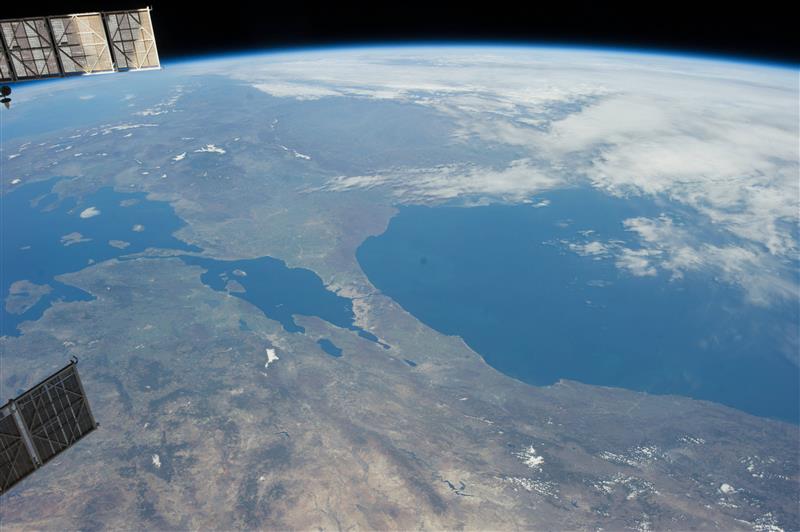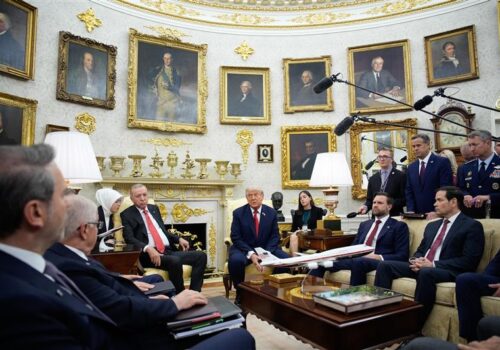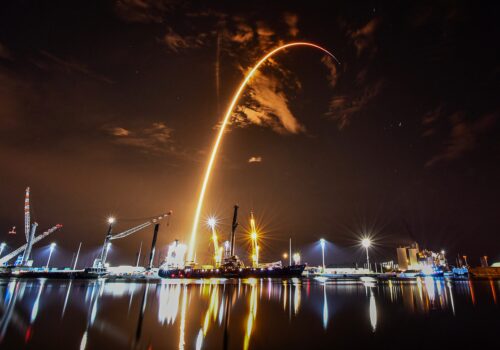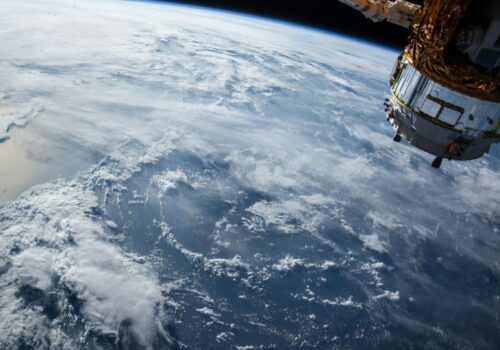Turkey’s space program has seen accelerated growth in the past few years. In 2024, it launched TÜRKSAT 6A, becoming the eleventh country in the world to manufacture its own geostationary communications satellite. Last year, Turkey also sent its first astronauts into space, with Alper Gezeravcı joining an International Space Station mission and Tuva Cihangir Atasever participating in a suborbital mission.
Building on these milestones, Ankara is now looking beyond Earth’s orbit. Ankara’s lunar ambitions are articulated through the Lunar Research Program, known by its Turkish acronym AYAP. The goal of the program in the first phase, or AYAP-1, is to goal hard-land (an impact landing to test key systems) on the moon next year. The goal of the second phase, AYAP-2, is for a rover to soft-land (a controlled landing that allows the spacecraft to remain intact and operate on the surface) in the 2030s. With its recently announced 2026 national space and aviation budget rising to $209 million from $140 million in 2025, Turkey is among the few nations capable of producing and operating complex satellite systems. These achievements will soon be showcased on the global stage when Turkey hosts the seventy-seventh International Astronautical Congress in Antalya next year. This symbolizes Turkey’s growing visibility in the global space community, but it also highlights the need for Ankara to adopt a diplomatic strategy to match its ambitions. In a recent conversation with Ahmet Yozgatlıgil, the President of the Middle East Technical University and former Turkish Deputy Minister of Industry and Technology, we spoke about the ways that Turkey can strengthen its diplomatic position in the space domain ahead of the Astronautical Congress.
Achievements without diplomacy
In 2021, President Recep Tayyip Erdoğan announced a National Space Program with ten goals. This agenda included moon landings, developing a regional positioning and timing system, creating a space technology development zone, and establishing a domestic spaceport.
However, Turkey has yet to publish a national space policy document to lay out its vision, principles, and diplomatic objectives. A space policy paper would provide transparency on the country’s activities and anchor them within a strategy that could be explained abroad, helping Turkey join partners in international coalitions.
The same goes for coordination between domestic agencies. The military, the communications sector, the Turkish Space Agency (TUA), TÜBİTAK Space, and universities all play an important role, but there is no formal National Space Council or interministerial structure to align this work with foreign policy objectives.
Ankara’s ambitious agenda and fast pace would be best managed and coordinated by the TUA, which was founded in 2018. Turkey “needs to name a lead convener,” to align the country’s space policy, Yozgatlıgil told me. “TUA is very suitable to be declared as a national coordinator for space diplomacy,” he said, as it is already harmonizing some joint national space projects.
Underrepresentation in global fora and initiatives
Turkey is a long-standing member of the United Nations (UN) Committee on the Peaceful Uses of Outer Space (COPUOS) and is one of the few countries to be a party to all five core UN space treaties, including the 1979 Moon Agreement. However, Turkey has not yet assumed the chairmanships or leadership positions in the subcommittees or working groups on issues including orbital debris, property rights, or guidelines for lunar exploration.
So far, Turkey has also not signed the Artemis Accords, a US-led framework for transparent and cooperative lunar exploration that was first signed in 2020 and now has fifty-seven signatories. Yozgatlıgil argued that Turkey should consider joining the Artemis Accords, but “also keep the doors open for collaborations with other lunar exploration initiatives.” Thus, Turkey can leverage its geography to act as a bridge between East and West when it comes to space policy. Turkey could both sign onto the Artemis Accords and work with the Russia- and China-led International Lunar Research Station (ILRS), as well as continuing to participate in space initiatives as part of both NATO and the Asia-Pacific Space Cooperation Organization.
Turkey has already taken early steps toward this bridging role through astronaut and industry partnership agreements with the US-based Axiom Space. It has also made agreements with the Japan Aerospace Exploration Agency, Senegal’s ASES, and regional partners under the Organization of Turkic States (OTS), as well as engaged in scientific collaboration with the Swedish Institute of Space Physics. Its Gökmen Space and Aviation Training Center in Bursa has hosted OTS training camps and the thirty-fourth Planetary Congress in 2023, reinforcing Turkey’s role as a provider of space education and capacity building.
Underappreciated strengths
Turkey’s space capabilities have dramatically increased since it launched its Earth observation satellites RASAT in 2011, Göktürk-2 in 2012, and even IMECE, which it launched in 2023 as its first indigenously produced sub-meter resolution Earth observation satellite. Now, Turkey has the capacity to design and manufacture a geostationary communications satellite, with TÜRKSAT 6A under the leadership of TÜBİTAK Space. This shift to a more assertive posture in space is a direct result of years of concerted national investment in science, technology, and human capital.
Satellite integration and payload development have been supported by Turkish Aerospace Industries and ASELSAN, respectively. In recent years, companies such as Gümüş Aerospace and Plan-S have developed the capacity for commercial constellations and nanosatellite platforms. Furthermore, Roketsan and DeltaV are advancing domestic launch and propulsion systems, completing an increasingly autonomous national value chain. “Turkey has a strong record of using satellites for humanitarian and civil purposes, such as disaster response, climate monitoring, and security communications,” Yozgatlıgil told me. He also spoke about how Turkish satellites have supported relief and resilience efforts in response to recent earthquakes and wildfires.
The academic and innovation actors involved in the space research landscape are also supporting these national efforts. Middle East Technical University (METU), based in Ankara, is contributing to international cooperation through projects such as the CHERI micro-rovers for China’s Chang’e-8 lunar mission and through the launch of “METU Space”, Turkey’s first dedicated space technopark. This initiative dovetails with the National Space Program’s emphasis on the creation of a Space Technologies Development Zone that will bring together investors, integrate small and medium-sized enterprises, and connect academia and industry in the space sector. Additionally, TÜBİTAK National Metrology Institute (UME) and TUA signed agreements with each other in October 2022. The two agencies conducted the Rubidium Atomic Frequency Standard Development Project. As the first major initiative under the framework of Turkey’s regional navigation satellite system, known as BKZS, the project focuses on enhancing domestic navigation sovereignty and protecting critical infrastructure. With its technical foundations now in place, Turkey’s next frontier lies in space diplomacy: projecting its emerging space capacity as a source of responsible leadership and constructive engagement in shaping global space governance.
Building the missing pillar: A Roadmap for space diplomacy
The following measures could help Turkey bolster its rapidly developing space capabilities with a diplomatic pillar, closing a significant gap in Ankara’s grand strategy.
- Establish a National Space Council and a Space Diplomacy Task Force to ensure policy coherence and diplomatic alignment to institutionalize interagency coordination. To align Turkey’s space capabilities with its foreign policy objectives, the government should consider establishing a Turkish National Space Council (TNSC) with direct accountability to the president. Modeled on the US National Space Council and France’s interministerial, CNES-based approach, the TNSC would be a high-level coordination body for policy across the diplomatic, defense, science, and industry sectors. The TNSC could provide strategic guidance, promote alignment between the TUA and other relevant institutions, and ensure policy continuity. Reporting to the TNSC, a Space Diplomacy Task Force could be established to integrate technical and diplomatic activities. Comprising representatives from the Ministry of Foreign Affairs, TUA, TÜBİTAK Space, and other relevant agencies, the task force would help develop Turkey’s positions in international negotiations, coordinate defense and civilian priorities, and convert scientific and technical accomplishments into diplomatic results.
- Publish a national space policy. As a first step, Turkey needs to issue a National Space Policy, developed with the right interdisciplinary space experts to set out the country’s vision for the peaceful uses of outer space, its positions on key space issues, and how it will balance civil, commercial, and security considerations in space. A national space policy would then be the basis for developing a National Space Law to codify such regulatory frameworks, address compliance with international obligations, and ensure predictability for private-sector involvement. The policy can be issued relatively quickly through executive coordination, whereas the law would more likely take longer to enact. Both the policy and the law would provide transparency into Ankara’s intentions and likely improve legal certainty for domestic space companies while demonstrating that Turkey wants to be a leader and not a follower in global space affairs.
- Elevate Turkey’s presence in key forums. Turkey’s presence in COPUOS, the UN Office for Outer Space Affairs, and the International Telecommunication Union should be more assertive. This means sending high-level delegations regularly, volunteering to chair working groups, and hosting side events to showcase Turkey’s initiatives.
- Leverage existing alliances and initiatives. Within NATO, for instance, space has been recognized as an operational domain since 2019, and the NATO Space Center in Ramstein works to coordinate allied space activities. Turkey could contribute capabilities and lobby for NATO space exercises that practice civil space support, such as satellite imagery for disaster response. Regionally, Türkiye could continue to build on its participation in platforms such as the Asia-Pacific Space Cooperation Organization and the Organization of Turkic States by taking a more proactive and innovative leadership role in cooperation, including joint projects, data-sharing, and capacity-building initiatives.
- Embrace global initiatives and forums. While carving an independent path, Ankara should sign the Artemis Accords. The Accords’ principles of transparency and interoperability in its work would lend Turkey normative credibility. This would not exclude cooperation with China on the ILRS, and balancing involvement with both the Artemis Accords and ILRS would be fully consistent with Turkey’s role as a bridge in its international relations. In my interview with him, Yozgatlıgil also suggested that Turkey can create its own forum on space diplomacy, which could be organized with Turkic states, Gulf countries, and other allies and partners.
The pace of Turkey’s technological advancement in space will only yield its maximum strategic benefits when it is coupled with a sustained diplomatic approach. By transforming satellites, rovers, and launch vehicles into policy tools, Ankara can go from being a mere participant in the global space governance architecture to an agenda-setter. With Turkey set to host the 2026 International Astronautical Congress, Ankara should make space diplomacy the next chapter of its grand strategy.
Elif Yüksel is a Fulbright scholar, a fellow of the Space Policy Institute, and an alumna of the International Space University. She is one of the leading Turkish experts in space policy and diplomacy. Currently, she works as a consultant for several private international space companies and voluntarily serves as an ambassador for the AstroAid Foundation.
The views expressed in TURKEYSource are solely those of the authors and do not necessarily reflect the views of the Atlantic Council, its staff, or its supporters.
Further reading
Thu, Oct 9, 2025
How energy and trade are redefining US–Turkey regional cooperation
TURKEYSource By Pınar Dost
As Ankara and Washington are recalibrating their energy and trade strategies, a new model of US–Turkey cooperation is emerging.
Mon, Aug 4, 2025
What could NATO’s commercial space strategy mean for the Gulf?
MENASource By Manal Fatima
The United States is well positioned to help extend NATO’s emerging commercial space ecosystem to the Gulf.
Fri, Jun 20, 2025
A guide to national security space trends in the GCC
Report By
AzurX provides a comprehensive picture of the innovative strategies, ambitious missions, and inspiring visions propelling GCC nation space programs to new heights.
Image: Earth observation taken by the Expedition 39 crew aboard the International Space Station. IMAGO/piemags via Reuters Connect.



